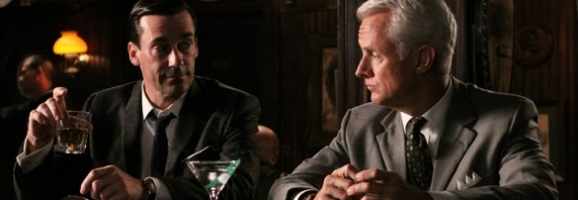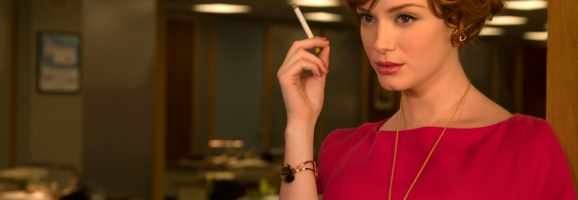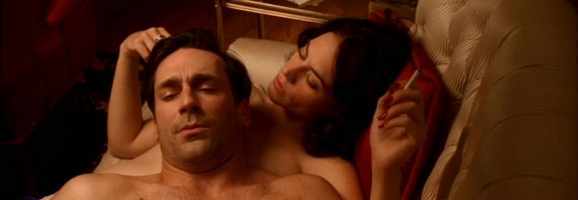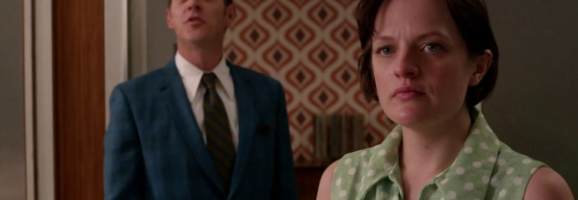Understanding The Vices Through Mad Men
Period dramas are known to teach and entertain the public on what it was like to live in a past era. Suffice to say, they can also help us enlighten on the psychological traits that occurred in the characters’ minds on their day-to-day lives. However, not every television show has the guts to delve into deeper on the addictions that the characters faced. Exploring our own vices through the acclaimed series Mad Men has taught us what it is like to live out our fantasies through means of accessible pleasures. As Mad Men premiered its seventh and final season on April 13, 2014, we take a look back on the most prominent vices that have made the AMC television show a natural part in today’s pop culture.
Alcoholism

All the men wanted to be him. All the women wanted to sleep with him. Casually holding his liquor while running his executive duties at the advertising agency, it’s no wonder that Don Draper’s cool and laid-back demeanor is the focus of the series. In reality, Don Draper is the embodiment of the typical alcoholic from the 1960s and 1970s as it was a time where liquor is king and mostly everyone needed at least one vice to keep their lives interesting. Some people have debated whether or not alcoholism in a professional environment was prevalent during the 1960s and 1970s. In an International Business Times article written by Benjamin Reeves, he portrayed that the three-martini lunch was a normal workplace practice from the 1940s through the 1970s. As this is considered to be a period drama, one can argue that the level of drinking on the show can be highly exaggerated. In truth, alcohol was visible for consumption during celebration and for after hours drink. However, there was no clear proof that the people who have worked in the advertising agency had amassed themselves to highly drunken levels just as the show portrays it.
While Don Draper never thought that his alcoholic adventures would not have any impact on his life, it was until the end of Season 6 when he realized that he had a major drinking problem. It was evident that he was struggling to cope with his addiction, despite his constant state of denial of his own actions. ABC News quoted an addiction specialist who said that “over the last ten years, alcoholism has been more fully understood as a disease. But in the sixties, bad behavior resulting from heavy drinking could be considered ‘macho’ and even romantic, rather than as a compulsive use of alcohol despite adverse consequences.” Roger Sterling sums this habit quite nicely:
You don’t know how to drink. Your whole generation, you drink for the wrong reasons. My generation, we drink because it’s good, because it feels better than unbuttoning your collar, because we deserve it. We drink because it’s what men do.
The unfortunate aspect of the show is that Mad Men has never been coy when it comes to bringing the worst traits under the influence of alcohol. It was never a rosy picture to be painted.
Smoking

The portrayal of drinking and smoking among wealthy businessmen and their wives during the 1960s is very accurate on Mad Men. Most people drank and smoked in those days as part of their social activities even if they did not do so the rest of the time. It took a couple of decades after the connection between smoking and cancer for the majority of adults to be non-smokers. There was no rehab in the 1960s and alcohol consumption was tolerated to a degree unthinkable today.
At the beginning of the season, the company Lucky Strike approached Sterling Cooper for an ad campaign in the wake of the Readers Digest report that smoking will lead to health issues. However in the fourth season, Lucky Strike fires Sterling Cooper Draper Pryce as its ad agency. This prompted Draper to create an advertisement for The New York Times titled “Why I’m Quitting Tobacco,” which announces the agency’s refusal to take tobacco accounts.
The ads that were portrayed during the 1960s were part of a great influence during that era where every type of cigarette brand targeted both genders. The idea of smoking was considered to be a rite of passage for many young adults as it was considered to be a grown up habit.
Infidelity

Regardless of what era we focus on, adultery and sexism will always be an ongoing issue in society. In the case of Mad Men, many of the main characters have strayed outside of their marriages. Don Draper was no stranger to infidelity as he have slept with other women while being married. As the show progressed during the seasons, one of the main reasons why many men and women have went outside of their marriage to sleep with someone else is because of the fact that deep down inside, they were not happy with their current situations. The happiness factor was more of an emphasis in the show than a power play game. Sure, you do have men that sleep with many women as possible because to them, it’s a gratifying experience that they are able to “feel their way” into power. Even in this time, it was still considered socially acceptable for a man to have as many affairs as he wanted and not get caught doing so.
Sexism

While sexism may not be a traditional vice as what we are accustomed to seeing, it is often used in conjunction when it comes to committing adultery. Sexism, by large, has often fueled a man’s bravado and egotistical views on women by placing the notion that just like children, they are meant to be seen and not heard. Unfortunately, because of the ideas being placed, women felt subjected to think that they are not fit to operate outside of their domestic duties.
Women had a much harder stance of being socially accepted in the workplace during the 1960s and 1970s. The underlying message that the only way a woman would be able to move up in the corporate ladder was for her to look pretty. Even if she were to excel in a higher position, it still wouldn’t last for too long. Unlike alcoholism, the gender issues that are portrayed by Mad Men are not exaggerated. As this is centered around the advertising agency, it would make a lot more sense for the producers of the show to focus on what have transpired during the work place. You can clearly see the push and pull relationships that the men and women had in the office environment. Two of the female characters, Joan Holloway and Peggy Olson, have been considered to be the feminists of the show. In the beginning of the season when the two characters were introduced, Joan mentioned to Peggy on how to succeed at her job:
You want to be taken seriously. Stop dressing like a little girl.
It’s not certain if there were many success stories of women who defied the sexism during the workplace in the 1960s and 1970s. However, it was a refreshing course of action to see two prominent women taking center stage as they fought their way through the glass ceiling that was placed above them.
Mad Men For The Modern Era
It can be easily noted that the vices that occurred during the 1960s – 1970 are no different in what we are experiencing in today’s society. However, because of the extremism that had happened during that time, it propelled regulations to moderate the consumption of alcohol and smoking. In most workplaces of today, there are a high level amount of rules that are placed to promote an ethical environment for the employers and employees to follow. That’s not to say that it would be a permanent solution as human nature does take control. At one point or another, you’ll often hear on the news that men and women are participating in illegal activities that are detrimental to the welfare of others. But lets not forget that we’ve experience much more corruption and hypocrisy in our earlier years.
Could we still keep on going and reliving our generations’ past mistakes? It’s a given since no two affairs and habits are the same. The question remains is for how long we can keep giving into temptation until we realize that we hit a brick wall and trying to recover from it. It took many years for Don Draper to realize that he had an addiction to drinking. The only difference between the Mad Men era and now is the number of resources that are made available to help addicts rehabilitate and reform.
Overall, Mad Men has proved to be one of the most engrossing television series that never held back in depicting the imagery of what have occurred during the 1960s and 1970s. As the show approaches to an end, we will miss the characters for helping bring forth a better understanding on what it was like to give into our own vices and the consequences that happened afterward.
Works Cited
Carr, Coeli (September 13, 2010). “Television’s Treatment of Alcoholism”. ABC News.
Reeves, Benjamin (August 14, 2012). “3 Reasons The 3-Martini Lunch Could Fix the Economy, Improve Your Work and Open New Horizons”. International Business Times.
What do you think? Leave a comment.











I’ve been in the advertising agency business since 1972. Didn’t recognize that there were stores of liquor in the offices, but the drinking and adventures after hours were way more interesting than the Mad Men depictation. Bookkeeper dancing topless for the office. Topless interviewing. Partners for key clients. 5 hour martini lunches with major clients. It was a crazy world then.
Do you think that’s a result of the high stakes nature of the business or just a piece of the work culture? I’m just curious if it’s a chicken or the egg kind of situation.
I watched from the beginning but was only a casual viewer. It wasn’t until the episode where Rogers daughter gets married and they dealt with the Kennedy assassination that I became a diehard. I love this show so much.
Man; I’m getting alcohol poisoning just watching this thing!
I JUST finished catching up on the show, and I must say, that Roger Sterling character sure is something, huh?
Women still don’t earn a dollar to a man’s dollar, women are denied promotions, paid less and are expected to work harder over their male counter parts. The guys take long lunches or company dinners and that’s OK with the boss. Yes, it hasn’t changed much in the workforce. It’s still a man’s world but women are determined to make it a dollar to a man’s dollar. It’s about equality and sadly there’s still a long way to go in this regard.
I don’t understand the Betty hate. The criticism of her seems to dwell on representing her as immature, naïve, foolish.
She seems to me to be a vivid depiction of a pre-second wave Betty (hmm see what they did there?) Friendan “problem without a name” upper-middle class white women. She was privileged and intelligent (anthropology degree, fluent in Italian). She did everything ‘right’ and had all the advantages yet the role society had for her was crippling, stifling, unfulfilling and depressing. The fact that I empathise with a privileged and in some ways pampered woman is a testament to the strength of the character. She was raised to be decorative, to be a compliment to her husband, meet him with a drink in hand, by his side at events, not have dreams or ambitions beyond being a picture perfect wife & mother. The fact that her husband repeatedly pursues and ultimately marries women who have ambition and drive hammers home how even though she did everything ‘right’ by the standards she was raised not only was she very unhappy but it wasn’t even what her partner wanted. She had no choice but to continue her 3rd unwanted pregnancy, probably forcing her to stay for a little longer in a horrible marriage. Her only chance to escape an unhappy marriage is to replicate the same role with a different man. Her immediate environment offer no escape only further judgement, remember how aghast the other ‘housewives’ were at Helen Bishop having, shock, evening walks? It seems easy to see how being so trapped, have so little freedom amongst privilege and advantage would be the reason she is so deeply depressed, rather than simplistically just writing her off as a whiny child-woman. I think it being rendered subtly rather than spelt out makes it more evocative.
Well said. I actually think Betty is (or at least was) one of the most interesting characters on the show, partly because she’s so unlikable. Yes, she’s often immature, self-absorbed and spoiled, but in a way, women like her (i.e. good housewives) were supposed to be essentially overgrown children. I think Betty is a rather chilling depiction of how oppressive and crippling traditional patriarchal values can be, just as Don is a good example of the effects of society’s obsession with masculinity. And to be honest, I didn’t really have a problem with how the show treated her character until the most recent season, when it was really obvious that they have no idea what to do with her.
It was season 5 and 6 that made me actively dislike Betty. I could understand everything she felt about Don, but when she supposedly got what she wanted and become even more a shrewish harpy it became hard to sympathize with that character and not think of her as a overgrown brat.
I worked in an office atmosphere from 1962 to 2003. In the 60’s the only thing close to this show might have been an advertising company. I never recalled ever in my sales days ever doing what these guys did.. Not saying, things did not happen during the lunch hour or after work; but not in the office, during the day. The show would not be any good ,if they did not embellish the truth for viewers.
This show does not fit in with the type of shows that I normally watch (Walking Dead, Doctor Who, Dexter, Game of Thrones), but there’s something about it that makes me love it more than any other show that I’ve ever seen, with the exception of Twin Peaks.
The hard part for me is articulating to people why it’s so great. The conversation normally devolves into, “You just have to watch it.” The thing about Mad Men is that it moves so slow that it’s hard for some people to get into it, but that’s part of what I like about it.
I’m still wondering whether this will be the year where Bert Cooper finally dies, or if he’s going to continue on hanging around and being irrelevant for the rest of the show as a narrative point — he’s a textbook example of a guy who should have retired by now, but has nothing to retire to (almost all the younger characters in the office apart from Ken and maybe Joan are on their way to being there).
Oh please, nobody partied at work or after work like we did in the 80’s.
The 80’s made the 60’s look like sesame street.
I think the drinking, smoking and the like is typical for the time. Remember, today is not like yesterday.
It was most definitely a different workplace 40 or more years ago. I worked in an office in a manufacturing plant and had to walk thru the mfg area numerous times during the day to get to the main office area. I witnessed a manager and shop steward “going at it” in her glass-walled office. Christmas parties were held on site until they got too wild with people drunkenly riding conveyor belts thru the factory and sneaking off in the warehouse storage area for sex. The place had quite the reputation for a while and it was embarrassing to admit where I worked because of the raised eyebrows and once-over looks I got when asked where I worked. I was the first woman to wear a pant suit to work back then so I guess I was a pioneer of sorts – ha! That company is no longer in operation but things had changed for the better over the 13 years I was employed there.
They should collect and publish a collection of stories titled “The Real Mad Men” or something. It’d be a big seller and interesting as heck.
Although it is directly related to the top commentor’s work place, the book that Mad Men was inspired by, “From Those Wonderful Folks That Gave You Pearl Harbor,” has similar depictions of the many antics that took place at ad agencies of that time.
Here’s an article on it. http://miamiherald.typepad.com/changing_channels/2010/07/ever-since-the-series-mad-men-went-on-the-air-in-2007-ive-wondered-if-it-drew-any-of-its-material-or-inspiration-from-a-boo.html
I’m sure that 30 or 40 years from now, our children will be nostalgic for the 2010’s.
As annoyed I get when people I know describe Mad Men as “that boring show” while singing the praises of things like, ugh, Dexter and The Walking Dead…
The amazing thing about Mad Men is how mysterious the main character still is, despite all the information we have about him. What kind of music and movies does Don like? I have no idea. I kind of think he doesn’t like any.
Don loves movies, especially European movies. He talked about La Notte with Bobbie Barett. He’s gone to see movies a few times over the years.
Don does go to movies while supposedly at work, a habit that’s kind of a dick move, but also makes sense, as he seems to use it to work out ideas. I think he actually watches an art film at one point (Don’s strange progressive attitudes and the way Hamm makes them plausible even in such a masculine straight arrow is why Hamm is a great actor.)
Peggy Olson has the best character arc since Michael Corleone. Fact. The idea that they pulled off her development from the naive earnest whatever girl of the Pilot to the Queen of Incredible believably is fucking amazing. She’s the best example of how rewarding it is to follow characters throughout the years in a longform story. Her arc is also Mad Men’s greatest departure from the Sopranos. No one as awesome as Peggy would’ve been allowed to exist or change for the better on The Sopranos.
The best thing too is that as great as Peggy’s become, they still shade her with moments of neuroses, unfulfilled desires and lack of confidence sometimes.
As confident as she is it’s the little moments of who she was that still surface that make it; the Ginsberg relationship, the way she related to Dawn the secretary etc.
Peggy is just such an amazingly well rounded and multifaceted character, and that’s saying something for a show that specializes in character’s changing and progressing.It’s just a brilliantly well rounded and I would say a realistic character that feels like it actually breathes.
I agree with the premise of the article: that Mad Men takes risks in depicting characters. Growth, depth, arc – if only more TV shows did this. So much TV, and so little quality.
This probably isn’t the most appropriate article to discuss this in, but reading through this reminded me of how bizarre it is that so many men look up to Don Draper and lionise him as some sort of epitome of manliness and cool.
I mean, aside from the rare flashes of old-fashioned respect and chivalry, he is arrogant, rude, dismissive and an all-round wreck of a human being.
Which leads me to believe that the writers of men’s publications across the world have never even seen an episode of Mad Men, and it might just be his cool suits and nice haircut that have sparked such a tremendous circlejerk over Don “You Should be Like Me” Draper.
I think you’ve articulated one of the many reasons I can’t get behind the show. The way the world fawns over the characters and fantasizes about the time and lifestyle, I keep waiting for the show’s grand reveal to be “surprise! Every character was always deplorable, vapid, and irredeemable!”
I couldn’t tell you why I could watch hours of villians like Deadwood’s Swearingen, or the Shield’s Vic Mackey, but one episode of Mad Men boils my blood to no end, perhaps because of the collective wistful sighs from those that really do idolize/admire Draper?
I always feel like the crazy/stupid one for not embracing this as the great tv drama of our generation
Blame society. As ugly as those qualities are, they’re still as pervasive as ever in the (business) world. You don’t get to the top by being a laid back nice guy, you get there by, basically, being Don Draper. Hence, it’s not that surprising that the type of guys chasing money, power and women look up to the character.
There are a number of reasons why Draper was/is lionized by so many viewers. The series was first aired in 2007, when the national psyche was very much beginning to rally against the norms of the establishment – Draper represents someone who, while appearing to be a member of society’s upper crust, is in fact a complete fabrication. The entire existence of Donald Draper (as advertising executive) is false. Draper exudes sexual and professional charisma and confidence. Even if his admirers don’t approve of all of his actions, there is something to be said for aspects of his personality and certainly for his business acumen. Finally, Draper, like almost all of the characters in the show, holds for viewers the nostalgic ideal of an American past that we long for on some level.
It might have been interesting to hear a bit about pride; the characters of Mad Men have quite the surplus of it, and it causes all kind of conflict in the series.
There are some pretty good observations about the content of Mad Men in this article. I feel you missed a few key points though. In interviews, Mathew Weiner, the showrunner, has talked about accuracy of the show depicting some of the aforementioned points you brought up and stated that they created the show as a prism to view our time through the social issue of the 60’s/70’s.
I love Mad Men, but it’s basically a soap opera, and I mean that in the least pejorative way possible. Character development takes takes center stage, sometimes to the detriment of the plot (you’ll notice this at the beginning of every season where the writers throw the characters head first into their new situations with little set up), which is great. No one stays true to the characters quite like Mad Men. They even avoid some of the hokeier devices that soap operas of old used to fall prey to.
And in the context of a modern audience, I think the shows characters do less to show us what it was like to live back then and expose some of our modern vices. People are the same as they have always been. The key differences we notice in our society compared to Mad Men’s era is basically window dressing. The same impulses that drove them back then are still in effect in us today.
This is a good basic article, I like the flavor of it but I think you could expound on it greatly. Many more vices are explored, and I think you could move sexism into a whole other article about racism, class warfare, and the counter culture age of the 60s as related to advertising. Great stuff.
I love how people say “kids these days” and complain about how we have lost all morals. Have we really? Watching Mad Men proves that humans have been immoral for a lot longer than just the past decade! In fact, perhaps more so? We are certainly more health-conscious and environmentally aware today, and smoking is not a commonplace office activity, nor is drinking all hours of the day. But these addictions still have a strong presence in our society, and probably always will. Humans love what gives them pleasure, be it sex, nicotine, drugs, alcohol, caffeine, you name it. Each generation has its own set of habits that does not make it better or worse than previous generations. So now there are more broken homes? The families I see in Mad Men and other period pieces do not look very wholesome even if Mommy and Daddy are married and living together. Mad Men helps open our eyes to the realities of human vice, so that maybe we can accept it and deal with it in healthy ways, not act like it is some shameful secret or a recent occurrence as a result of violent video games or the sexual revolution or Obama.
Love MAD MAN!!
I am curious as to what is going to happen with Sally. She is probably the most intricate and intriguing character at this moment. She went through her ‘bad girl’ rebellious mode in her boarding school and now is this much more mature girl that has a better picture of what is going around with the characters than anyone else. She knows of her mother’s troubles and Don’s secrets and vices. She is this growing teenager that has a better sense of morality than the adults in the show and has a lot to add but is constantly dismissed because of her age. She seems to have a better understanding of herself than would most kids at her age. She rebels in two ways: either she tries to be a ‘bad girl’ or she tries to vocalize bold feminist remarks; both are frowned upon due to her age and the period that she is living in. Eventually she is just a fallout to her parents’ mess and I wonder if she comes out a better person or is doomed to repeat her mother’s cycle.
Mad Men did a great job of not trying to be the 1960s but actually becoming the 1960s. I feel as if that is part of why we got the accurate representation of both alcohol and sexism. There are a lot of shows out there that try to be a decade in which they are based but do not actually become that decade. Take a look at the more recent HBO show, Vinyl. Despite the fact that the show itself was not very good, it felt like it was trying to be the 1970s. In the first few episodes I watched of Vinyl there were tons of drugs used and booze drank but did any of it matter? No. There was no meaning behind it because it did not give us a real look at the 1970s.